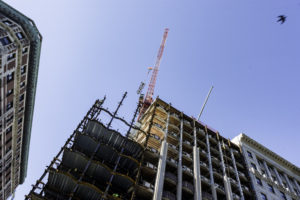 Massachusetts must reach net zero by 2050 — effectively eliminating all carbon emissions from our transportation, building and electricity sectors — while also cutting emissions in half by the end of this decade.
Massachusetts must reach net zero by 2050 — effectively eliminating all carbon emissions from our transportation, building and electricity sectors — while also cutting emissions in half by the end of this decade.
What are some of the obstacles to getting there?
Increasing Energy Demand With Little Supply
Reaching net zero will require substantially increasing the electrification of every sector of our economy. But right now, our energy capacity is strained, and our power grid still burns too much oil and coal to meet peak demand.
High Cost of Energy
Every winter, a number of expensive constraints leave New Englanders paying an estimated $1 billion in increased costs. Today, Massachusetts’ utility rates remain among the highest in the country while being one of the costliest states to do business.

A Significant Housing Shortage
Massachusetts has some of the highest housing costs in the nation, a significant shortage of affordable housing and high construction costs. Requiring homes and buildings to use more expensive sources of heating and electricity could deepen these challenges.
A Fragile Economic Recovery
As the Commonwealth’s residents and businesses continue to recover from the economic devastation of the COVID-19 pandemic, policymakers must carefully consider any decision that could dissuade economic investment in Massachusetts — such as increasing the cost of energy or construction.
Limited Options for Renewable Development
While we are encouraged by the potential for offshore wind, rapidly expanding electrification infrastructure and providing renewable energy for 7 million people within 10,000 sq. miles provides a host of challenges. Given the limited acreage available, the environmental tradeoffs of siting solar farms, and the impracticality of rooftop solar in many cities and towns, solar remains expensive and unachievable for our residents and businesses.